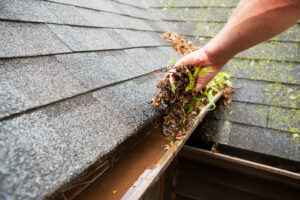 Summer storms can create serious issues for rental property owners and landlords, with clogged gutters and poor drainage leading to water damage and costly repairs. Through diligent landlord storm prep, focusing on rental property drainage and gutter maintenance, you can protect your rental property and avoid unwanted surprises. This guide offers essential strategies to ensure safety and resilience during peak storm season.
Summer storms can create serious issues for rental property owners and landlords, with clogged gutters and poor drainage leading to water damage and costly repairs. Through diligent landlord storm prep, focusing on rental property drainage and gutter maintenance, you can protect your rental property and avoid unwanted surprises. This guide offers essential strategies to ensure safety and resilience during peak storm season.
Why Rental Property Drainage Matters
For many reasons, good water drainage is one of the most important things to stay on top of as a landlord. That’s because if water isn’t appropriately directed away from your structure, it can seep into the foundation, cause basement flooding, erode landscaping, and even weaken structural elements over time.
These and other issues can lead to serious and expensive repairs, or even structural failure. For this reason, preventing water damage during summer storms isn’t just about saving money: it’s about protecting your investment now and for years to come.
Inspect Gutters and Downspouts Regularly
The first line of defense against water damage and flooding is your rental property’s gutters and downspouts. Together, gutters and downspouts form a system for channeling rainwater safely away from your structure. When this system stops working efficiently, problems arise.
Clogged gutters can overflow, causing water to flow down walls and pool around the foundation. If your rental home has a basement, pooling water can seep inside, causing flooding and potentially damaging the foundation.
To prevent these issues, schedule regular gutter cleaning for your rental property. The ideal times to clean your gutters are early in the spring and again before peak storm season.
Also, don’t forget the downspouts! Make sure they are clear of debris and positioned to direct water at least several feet away from the home’s foundation. Downspout extensions are an easy and affordable way to enhance downspout functionality, helping you direct water away from trouble spots.
Improve Grading and Yard Drainage
Even with gutters in top shape, poor grading in the property’s yard can result in pooling water near the foundation. Landlords should walk around their property after heavy rains to identify signs of water pooling or slopes directing water toward the house. Regrading the yard or installing a simple drainage solution, such as a French drain, can prevent water damage during summer storms. These adjustments are minor compared to the damage water can do to your structure over time, making them essential for property protection.
Clear Debris and Maintain Landscaping
Unmaintained trees and shrubs can exacerbate drainage issues by producing debris that clogs gutters and drains. A single summer storm can generate enough debris to clog gutters, disrupting water flow. Keeping trees and shrubs trimmed back and investing in regular landscape cleanup ensures water flows freely, protecting your rental property’s drainage system and maintaining its efficiency.
Partner with Tenants for Prevention
While landlords bear the primary responsibility for protecting their property from the dangers of poor drainage, residents can play a vital role by reporting water pooling, overflowing gutters, or signs of damage. Encourage them to keep the yard clear of debris. When landlords and residents work together, minor problems are addressed early, preventing costly repairs and promoting a cooperative environment.
Be Prepared, Stay Dry
With proactive landlord storm prep, summer storms can be less stressful. By prioritizing rental property drainage and gutter maintenance, you can prevent costly damage and keep your property in great shape, providing peace of mind. For more ways to protect your investment in Saugatuck, the local experts at Real Property Management Homestead are ready to assist. Contact us at 269-888-5717 to ensure your property is prepared for any storm.
We are pledged to the letter and spirit of U.S. policy for the achievement of equal housing opportunity throughout the Nation. See Equal Housing Opportunity Statement for more information.


